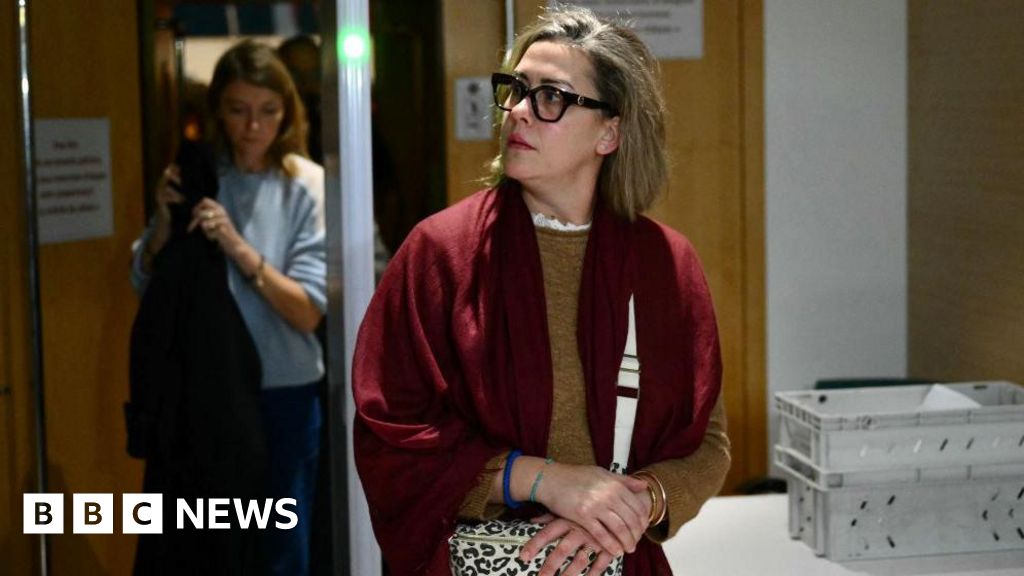Man who drugged wife in French mass rape case told: You’ll die alone

 CHRISTOPHE SIMON/AFP
CHRISTOPHE SIMON/AFPTensions at the French mass rape trial burst into the open on Wednesday when Dominique Pelicot’s daughter Caroline shouted at her father from across the courtroom that he would “die alone like a dog”.
Caroline Darian, 45, has repeatedly said she is convinced her father drugged and abused her after semi-naked photos of her asleep were found on his laptop.
He has denied abusing her but has admitted drugging his wife Gisèle for a decade and recruiting men online to rape her in their home when she was unconscious.
Dominique Pelicot and 50 other men have been on trial since September, and a verdict is expected on 20 December.
During an emotional day in court in Avignon, Gisèle Pelicot’s lawyers gave their closing arguments, describing the historic nature of the trial and paying tribute to her courage in waiving her anonymity to bring the mass rape trial into the open.
In her statements to the court Caroline spoke of her anguish at what she says are persistent lies by her father.
Earlier this week, with a voice full of emotion, she told the court her life had “stopped” when police first showed her photos from her father’s laptop in 2020.
On Wednesday, Dominique Pelicot was given a chance to address his daughter while taking the stand for the final time in this trial.
The main defendant said he most wished he still had Caroline’s support.
“Some may laugh but it’s my daughter I wish I could look at in the face. It hurts to see her like this,” he said, sitting in a glass box only metres away from his daughter and the rest of his family.
“I would love to see her, I would love to talk to her,” he added. As his voice faltered, Caroline’s rose: “I will never come see you. Never. You will die alone like a dog,” she shouted.
“We all die alone,” he replied. “You especially,” she hit back.
It was the last public exchange between a father and daughter who by all accounts had had, for many years, a loving and close relationship.
Mr Pelicot recalled visiting her in hospital when she was recovering from surgery as a child so he could hold her and comfort her, and shared memories of her teenage years.
When he repeated that he would always love her even if she had stopped loving him, she looked ahead silently, tears streaming down her face – but did not respond.
It was only later, when the session ended, that she approached the box her father sat in and shouted: “You had two months [to tell the truth]!”
During questioning, Mr Pelicot also stated that he was a sex addict and that getting found out by police in November 2020 had “unburdened him”.
He denied that his crimes against his wife had been sparked by an inferiority complex or by a desire for revenge for an affair she had in the 1980s.
Asked what he thought about chemical submission – drugging someone for the purposes of coercion or assault – he answered: “It’s crap. It annihilates everything. It should never be done.”
Mr Pelicot’s statements were followed by closing arguments from Gisèle Pelicot’s legal team.
Lawyers for the 50 other defendants will give their own closing arguments from next week. They are expected to explore more deeply the defence that many of the men cannot be guilty because they did not realise Ms Pelicot was unconscious and therefore did not “know” they were raping her.
Over almost three hours Ms Pelicot’s lawyers, Antoine Camus and Stéphane Babonneau, retold the horrific story of Dominique Pelicot’s crimes, peppering their account with literary references.
“Everyone contributed to this monstrosity on their own level, and allowed a woman’s ordeal to go on. It’s the banality of evil of [philosopher] Hannah Arendt,” said Mr Camus.
 Getty Images
Getty ImagesThey pleaded with the judges to hand down sentences that reflected the extent of the suffering of Gisèle Pelicot and her family.
Mr Camus said he was aware of the “expectations and hopes in this room and beyond” for the trial, which he said he described as historic, because “we badly, urgently want and need it to be”.
Leaning heavily on the notion of free will, he dismissed the defence’s argument that many of the men who allegedly raped Ms Pelicot did so because they were intimidated, manipulated or tricked by her husband. “Manipulation is not hypnosis,” he said.
The fact they were all aware that Mr Pelicot was “recruiting” many other men too should be taken into account by the judges, he added.
“Everyone who came into that house of horrors knew that others had come before him and others would follow,” Mr Camus said.
His colleague painted a devastating picture of Ms Pelicot’s life since her husband’s crimes had become known.
Stéphane Babonneau then described what had led Ms Pelicot – who by then was living in a small village under her maiden name – to give up her anonymity and open the trial to the public and the media.
It was in 2023, he said, when French media began reporting on the Pelicot case using pseudonyms that “a feeling of rebellion started to take hold of Gisèle Pelicot”.
“She decided to take back control of her life. The moment had come for shame to change sides.”
The will to stop hiding had awoken in her, he said, because she hadn’t done anything wrong. And she thought the details of her case and the videos of the alleged assaults would help expose the reality of rape.
“For her story to be useful and to help other women she understood she had to give up the anonymity that had served her for years,” Mr Babonneau explained. “She had to accept she would forever be the victim of the Mazan rapes.”
The lawyer also urged judges not to accept that the defendants had made a “mistake” when – as some have said – they raped Ms Pelicot involuntarily or “out of stupidity or ignorance”.
“If you accept the right to make a mistake, what will stop another man tomorrow from saying that when a woman told him ‘no’ he actually understood ‘yes’? That he also made a mistake?”
“I ask you to reject the right to make mistakes which would put society in danger – and at the risk of seeing more Gisèle Pelicots,” Mr Babonneau said.
He ended by paying tribute to Ms Pelicot and said the trial would be a “legacy” for future generations: “They will hear the name Gisèle Pelicot, they will hear about her courage and about the price she paid.”
Turning to look at Ms Pelicot, he said: “You did your job. You went beyond what was expected of you.”
“Now, pass on the torch to the others to carry on the fight you never chose.”
Gisèle Pelicot, to his right, wiped her eyes.
World News || Latest News || U.S. News
Source link




